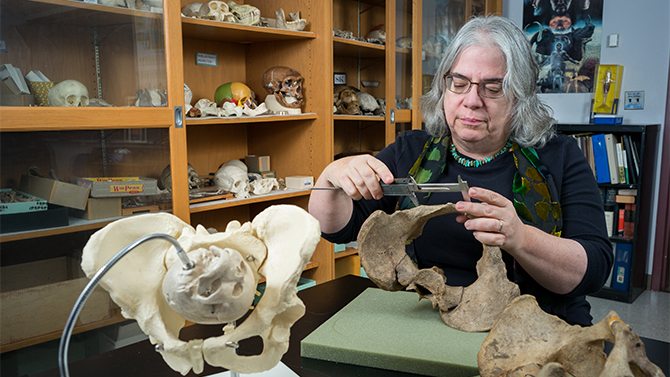


New AAAS Fellow
Photo by Evan Krape November 28, 2016
UD anthropologist Karen Rosenberg honored by scientific society
Karen Rosenberg, professor of anthropology at the University of Delaware, has been named a fellow of the American Association for the Advancement of Science (AAAS) for her accomplishments in research and leadership.
She is among 391 AAAS members elected by their peers this year to be fellows in the world’s largest general scientific society.
In announcing the honor, the society cited her “distinguished contributions to understanding the evolution of human childbirth, including its biological and cultural significance, and for leadership in professional associations and teaching.”
A biological anthropologist, Rosenberg specializes in paleoanthropology. Her research interests are in the origin of modern humans and the evolution of modern human childbirth and human infant helplessness.
She is the co-editor of a new book, Costly and Cute: Helpless Infants and Human Evolution, published Nov. 1 by the University of New Mexico Press in association with the School for Advanced Research Press.
The book resulted from a weeklong seminar that Rosenberg and co-editor Wenda Trevathan led at the School for Advanced Research in Santa Fe to examine how human infants — who are born in an extremely helpless and vulnerable state and remain dependent on their parents for a relatively long time after birth — spend that period of helplessness learning such important skills as language and social interaction.
“We know that newborn babies recognize their mother’s language and quickly recognize her face,” Rosenberg said. “They’re very in tune with the world even though they can’t do anything.”
Costly and Cute explores how human are similar to and different from infants of other species and how the helplessness of newborns has shaped human evolution.
“Babies need to engage with us,” Rosenberg said. “They’ve evolved to be what we find cute, and we’ve evolved to find them cute.”
Rosenberg has studied fossils and modern human skeletal material in Europe, North America, Asia and Africa in conducting her research on the evolution of human childbirth. She has published her work in edited volumes as well as anthropological and clinical obstetrical journals.
She has spoken about her work, and more generally about what anthropologists do, at schools and senior centers and at anthropological and obstetrical conferences.
For the AAAS, Rosenberg has organized two symposia in recent years, one on “The Scars of Human Evolution” — showing how many common medical issues such as foot and back injuries are consequences of our evolutionary history — and one on “The Invisible Woman in Human Evolution.”
Her current research continues to focus on evolution and childbirth, and she also is studying the increasingly high numbers of women in countries such as Brazil and Italy, for example, choosing to deliver their babies by Caesarian section. That practice, she said, “is dangerous for women, and there’s also some evidence that it’s not good for babies.”
Rosenberg, who earned her doctoral degree at the University of Michigan, joined the UD faculty in 1987.
More about the AAAS
The nonprofit AAAS was founded in 1848 and includes nearly 250 affiliated societies and academies of science, serving 10 million individuals. It publishes the journal Science, which has the largest paid circulation of any peer-reviewed general science journal in the world.
The society is open to all and fulfills its mission to “advance science and serve society” through initiatives in such areas as science policy, international programs, science education and public engagement.
The new class of AAAS fellows was officially announced in the “News and Notes” section of Science on Nov. 25.
Contact Us
Have a UDaily story idea?
Contact us at ocm@udel.edu
Members of the press
Contact us at 302-831-NEWS or visit the Media Relations website

